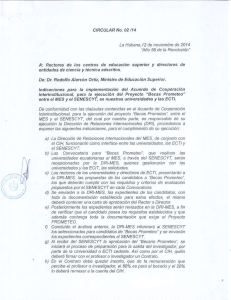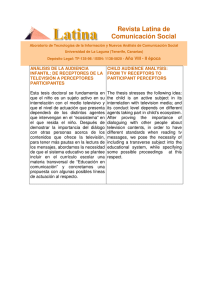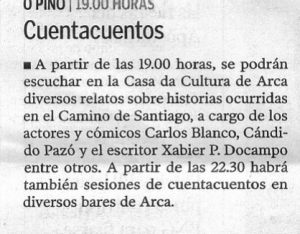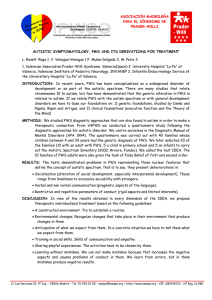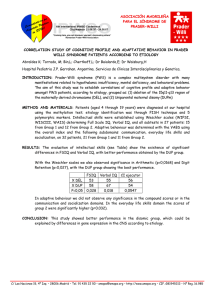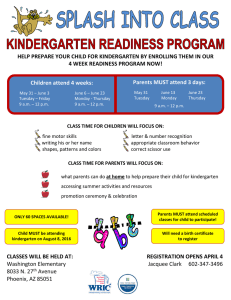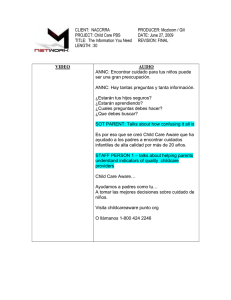Parent - child relationship in PWS
Anuncio
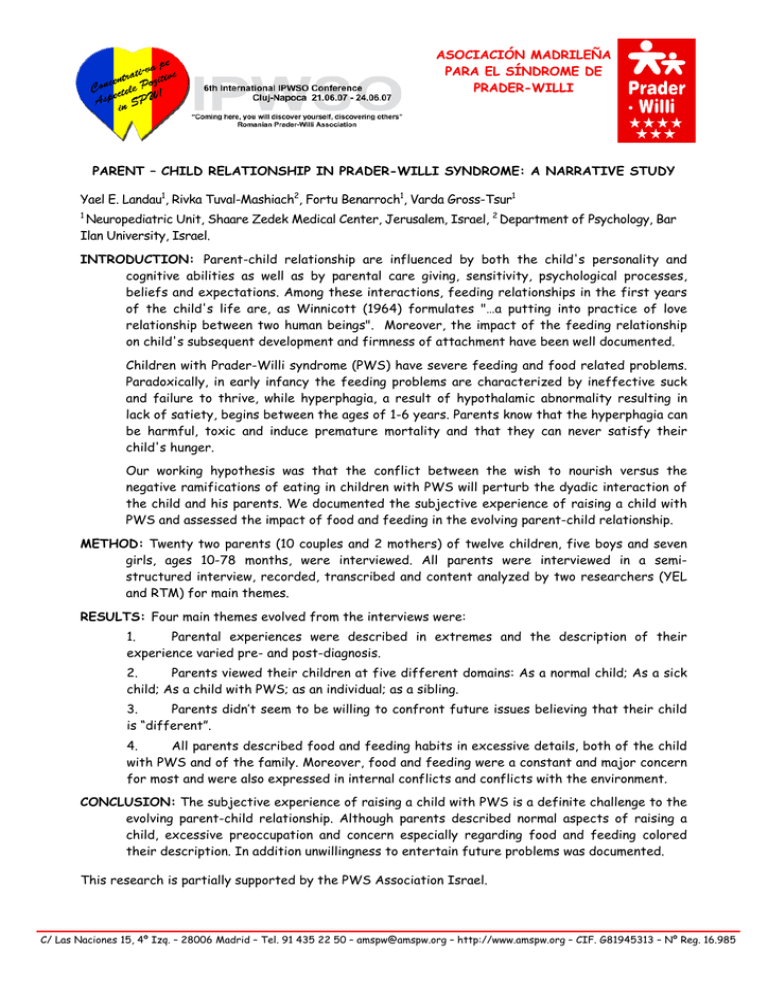
ASOCIACIÓN MADRILEÑA PARA EL SÍNDROME DE PRADER-WILLI PARENT – CHILD RELATIONSHIP IN PRADER-WILLI SYNDROME: A NARRATIVE STUDY Yael E. Landau1, Rivka Tuval-Mashiach2, Fortu Benarroch1, Varda Gross-Tsur1 1 Neuropediatric Unit, Shaare Zedek Medical Center, Jerusalem, Israel, 2 Department of Psychology, Bar Ilan University, Israel. INTRODUCTION: Parent-child relationship are influenced by both the child's personality and cognitive abilities as well as by parental care giving, sensitivity, psychological processes, beliefs and expectations. Among these interactions, feeding relationships in the first years of the child's life are, as Winnicott (1964) formulates "…a putting into practice of love relationship between two human beings". Moreover, the impact of the feeding relationship on child's subsequent development and firmness of attachment have been well documented. Children with Prader-Willi syndrome (PWS) have severe feeding and food related problems. Paradoxically, in early infancy the feeding problems are characterized by ineffective suck and failure to thrive, while hyperphagia, a result of hypothalamic abnormality resulting in lack of satiety, begins between the ages of 1-6 years. Parents know that the hyperphagia can be harmful, toxic and induce premature mortality and that they can never satisfy their child's hunger. Our working hypothesis was that the conflict between the wish to nourish versus the negative ramifications of eating in children with PWS will perturb the dyadic interaction of the child and his parents. We documented the subjective experience of raising a child with PWS and assessed the impact of food and feeding in the evolving parent-child relationship. METHOD: Twenty two parents (10 couples and 2 mothers) of twelve children, five boys and seven girls, ages 10-78 months, were interviewed. All parents were interviewed in a semistructured interview, recorded, transcribed and content analyzed by two researchers (YEL and RTM) for main themes. RESULTS: Four main themes evolved from the interviews were: 1. Parental experiences were described in extremes and the description of their experience varied pre- and post-diagnosis. 2. Parents viewed their children at five different domains: As a normal child; As a sick child; As a child with PWS; as an individual; as a sibling. 3. Parents didn’t seem to be willing to confront future issues believing that their child is “different”. 4. All parents described food and feeding habits in excessive details, both of the child with PWS and of the family. Moreover, food and feeding were a constant and major concern for most and were also expressed in internal conflicts and conflicts with the environment. CONCLUSION: The subjective experience of raising a child with PWS is a definite challenge to the evolving parent-child relationship. Although parents described normal aspects of raising a child, excessive preoccupation and concern especially regarding food and feeding colored their description. In addition unwillingness to entertain future problems was documented. This research is partially supported by the PWS Association Israel. C/ Las Naciones 15, 4º Izq. – 28006 Madrid – Tel. 91 435 22 50 – amspw@amspw.org – http://www.amspw.org – CIF. G81945313 – Nº Reg. 16.985 ASOCIACIÓN MADRILEÑA PARA EL SÍNDROME DE PRADER-WILLI La relación padres-hijos en el síndrome Prader-Willi: un trabajo narrativo Yael E. Landau1, Rivka Tuval-Mashiach2, Fortu Benarroch1, Varda Gross-Tsur1 1 Neuropediatric Unit, Shaare Zedek Medical Center, Jerusalem, Israel, 2 Department of Psychology, Bar Ilan University, Israel. Traducido por: J. Akorda Introducción: La relación padres-hijos está influida tanto por la personalidad y capacidades cognitivas del niño como por las atenciones, sensibilidad, procesos psicológicos, creencias y expectativas de los padres. Entre estas interacciones, las relaciones a la hora de la comida en los primeros años de vida del niño son, como formula Winnicott (1964) "... una puesta en práctica de la relación amorosa entre dos seres humanos". Por otra parte, se ha documentado bien el impacto de la relación biberón-comida sobre el desarrollo posterior del niño y la firmeza del afecto. Niños con el síndrome Prader-Willi (PWS) tienen graves problemas relacionados con el biberón y la comida. Paradójicamente, en la primera infancia los problemas de alimentación se caracterizan por una succión poco eficaz y una incapacidad de crecer, siendo así que la hiperfagia (una consecuencia de la anomalía hipotalámica que lleva a la insaciedad) empieza entre 1 y 6 años. Los padres saben que la hiperfagia puede ser dañina, tóxica y provocar una mortalidad prematura, y que ellos nunca pueden satisfacer el hambre de sus hijos. Nuestra hipótesis de trabajo fue que el conflicto entre el deseo de alimentar frente a las ramificaciones negativas del comer en niños con PWS perturbaría la interacción diádica del niño con sus padres. Hemos documentado la experiencia subjetiva de criar a un niño con PWS y hemos valorado el impacto de la comida y alimentación en la relación progresiva entre padres e hijos. Método: Se entrevistó a veinte padres (10 parejas y 2 madres) de doce niños, cinco chicos y siete niñas, de edades entre 10 y 78 meses. Se entrevistó a todos los padres con una encuesta semiestructurada, que fue registrada, transcrita y analizada en sus contenidos por dos investigadores (YEL y RTM) respecto a los temas principales. Resultados: De las entrevistas se desprendían cuatro tremas principales: 1. 2. 3. 4. Las experiencias de los padres se describían detalladamente y la descripción de sus experiencias variaban entre el prediagnóstico y el postdiagnóstico. Los padres veían a sus hijos en cinco esferas distintas: como un niño normal; como un niño enfermo; como un niño con PWS; como un individuo; como un hermano. No parecía que los padres se inclinaran a afrontar los temas futuros con la convicción de que su hijo era "diferente". Todos los padres describían los hábitos de alimentación con excesivos detalles, tanto del niño con PWS como de la familia. Además, la alimentación (biberón y comidas) era una preocupación constante e importante para muchos y también se manifestaban en conflictos internos y conflictos con el entorno. Conclusión: La experiencia subjetiva de criar a un niño con PWS es un reto decisivo para la relación que se desarrolla entre padres e hijos. Aunque los padres describían los aspectos normales de criar a un niño, la excesiva preocupación e inquietud excesivas respecto a la alimentación coloreaba su descripción. Se demostró, además, la poca disposición a tener en cuenta los problemas futuros. C/ Las Naciones 15, 4º Izq. – 28006 Madrid – Tel. 91 435 22 50 – amspw@amspw.org – http://www.amspw.org – CIF. G81945313 – Nº Reg. 16.985
